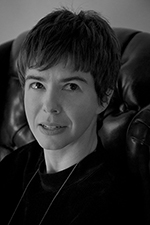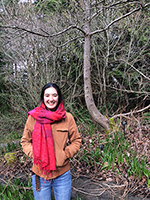Four Weeks 'til Deadline!

Emerging writers who have yet to publish their fiction in book form (a book is defined to have a length of 48 pages or more) are encouraged to send us short stories of 3,500 words or less. One winner will take home the $1,000 prize!
This year's judge is Mehdi M. Kashani. Read an interview with him to find out what he's looking for in a winning story.
Entry fee is discounted and comes with a complimentaryone-year print subscription:
$25 CAD for Canadian entries
$30 USD for entries from the USA
$35 USD for entries from elsewhere
Full contest information on the Malahat Review website.
Helen Guri (poetry)
 Malahat Review Publicity Manager L'Amour Lisik talks with Helen Guri, winner of the 2019 P.K. Page Founders' Award for Poetry for "Speech," which appeared in the Queer Perspectives Issue #205.
Malahat Review Publicity Manager L'Amour Lisik talks with Helen Guri, winner of the 2019 P.K. Page Founders' Award for Poetry for "Speech," which appeared in the Queer Perspectives Issue #205.
LL: What did it mean for you to be part of the Queer Perspectives Issue?
HG: It was lovely to be invited to contribute to the Queer Perspectives issue, and it made my inner 19-year-old very happy—both in terms of being publicly and “officially” recognized as queer, which isn’t an experience I’ve consistently had access to despite coming out pretty young, and in terms of breaking into what is, in my mind, a historically pretty conservative Canadian litmag with a saucy poem.
Read the rest of Helen's interview on our website.
Neal Debreceni (creative nonfiction)
 Charles Lillard Founders' Award 2019 judge Dale Lee Kwong talks with Neal Debreceni, winner of the award for "Life in the Fab Lane," which appeared in the Queer Perspectives Issue #205.
Charles Lillard Founders' Award 2019 judge Dale Lee Kwong talks with Neal Debreceni, winner of the award for "Life in the Fab Lane," which appeared in the Queer Perspectives Issue #205.
DLK: When did you first “come out of the closet” as a writer?
ND: The use of the “closet” terminology truly feels appropriate in terms of my journey as an author. Writing has always been a central part of my life; however, owning the identity of “author” is something I’ve shied away from. I have always lacked confidence in my writing, not so much in terms of doubting my ability to string words together, but by questioning whether I had anything meaningful to say that would engage readers. As a result, I’ve kept that part of my life very private, rarely—if ever—sharing it with friends or family. Life in the Fab Lane is only the second piece I’ve submitted for publication, and the first published. I guess you could consider this piece, and this shockingly unexpected award, as my coming-out party.
Read the rest of Neal's interview on our website.
Samantha Jade Macpherson (fiction)
 Malahat Review Publicity Manager L'Amour Lisik talked with Samantha Jade Macpherson last year when she'd recently won the 2018 Novella Prize for "Tattoo." The novella, which appeared in Issue #203, has also won the 2019 Jack Hodgins Founders' Award. Read an excerpt from the original interview below.
Malahat Review Publicity Manager L'Amour Lisik talked with Samantha Jade Macpherson last year when she'd recently won the 2018 Novella Prize for "Tattoo." The novella, which appeared in Issue #203, has also won the 2019 Jack Hodgins Founders' Award. Read an excerpt from the original interview below.
LL: I’m always interested in how stories grow. Was "Tattoo" always intended to be written as a novella?
SM: This story has been through many versions, all of them wildly different, but I’ve always been interested in the idea of the tattoo. At first it was more a meditation on art, and how much we are willing to give for it, but the final version buries that thread in favour of the bodily act of tattooing. Tattooing makes me think of ritualized or compartmentalized pain—because it’s pain that we choose for ourselves—and I find it a pretty interesting topic for fiction.
It wasn’t always meant to be a novella. “Tattoo” started out as a 4,000 word workshop story. Two years later it had ballooned to over 20,000 words. Another two years after that, I had cut it down to about 10,000. That’s where it stands now.
Read the rest of Samantha's interview on our website.